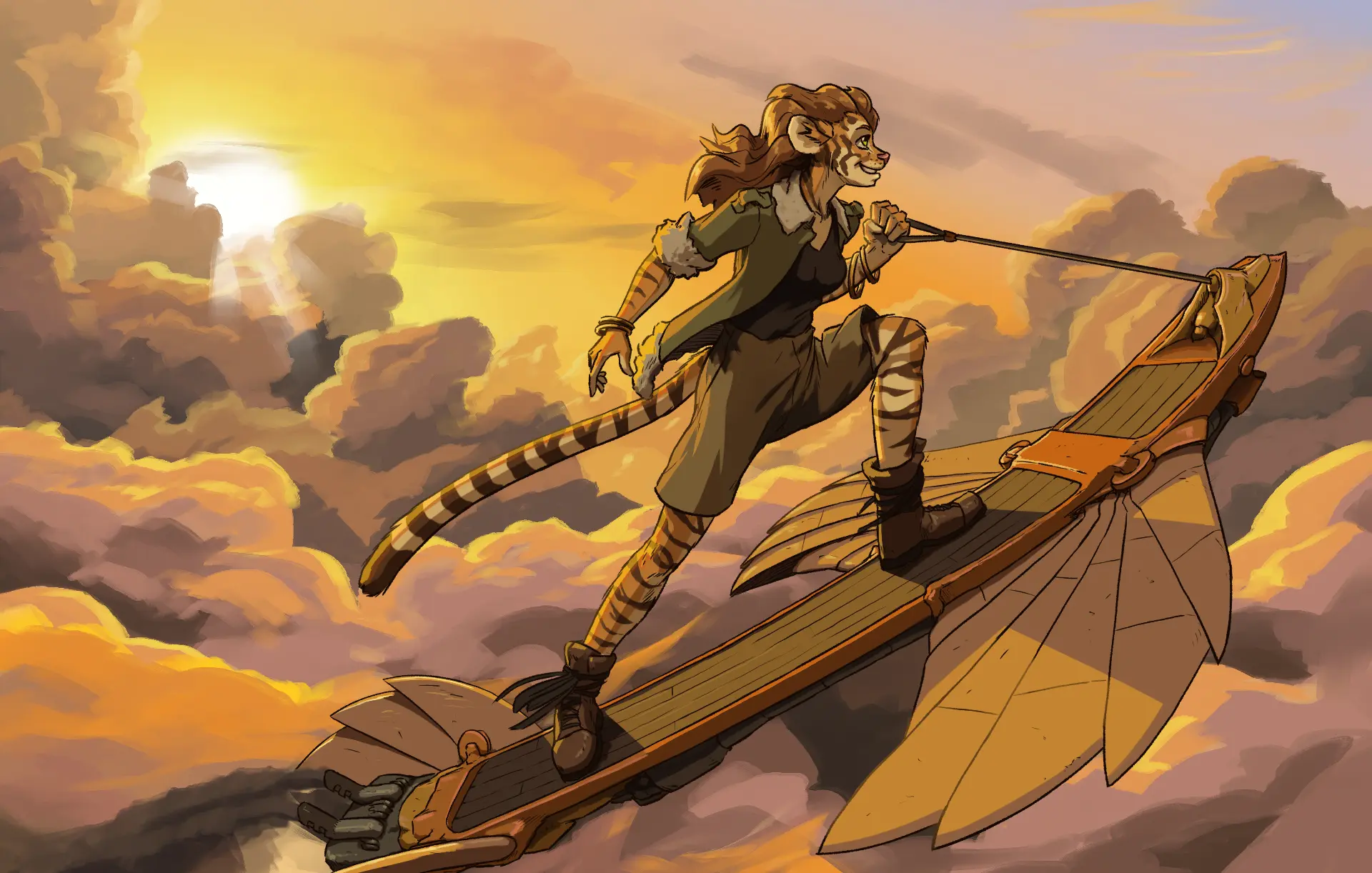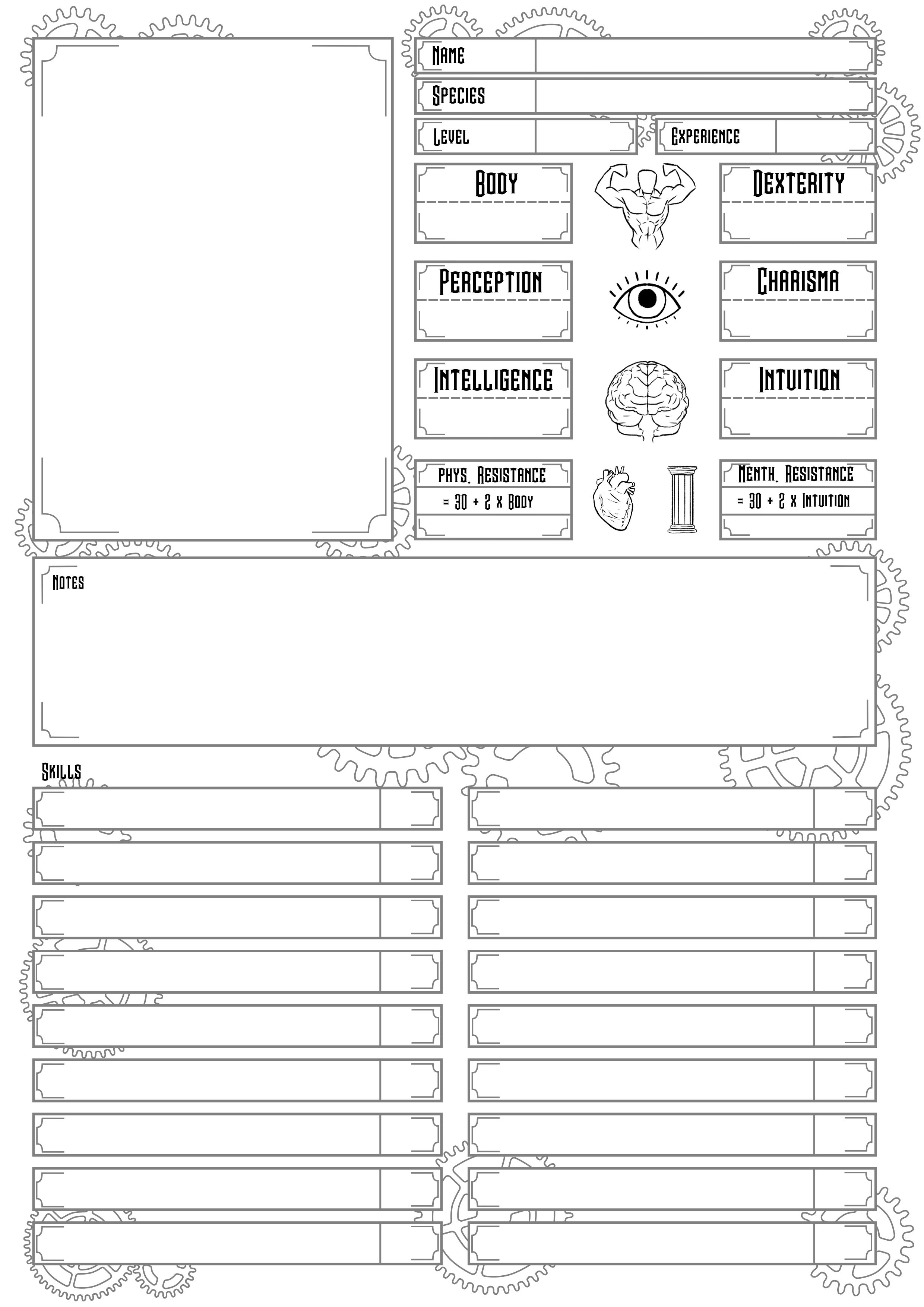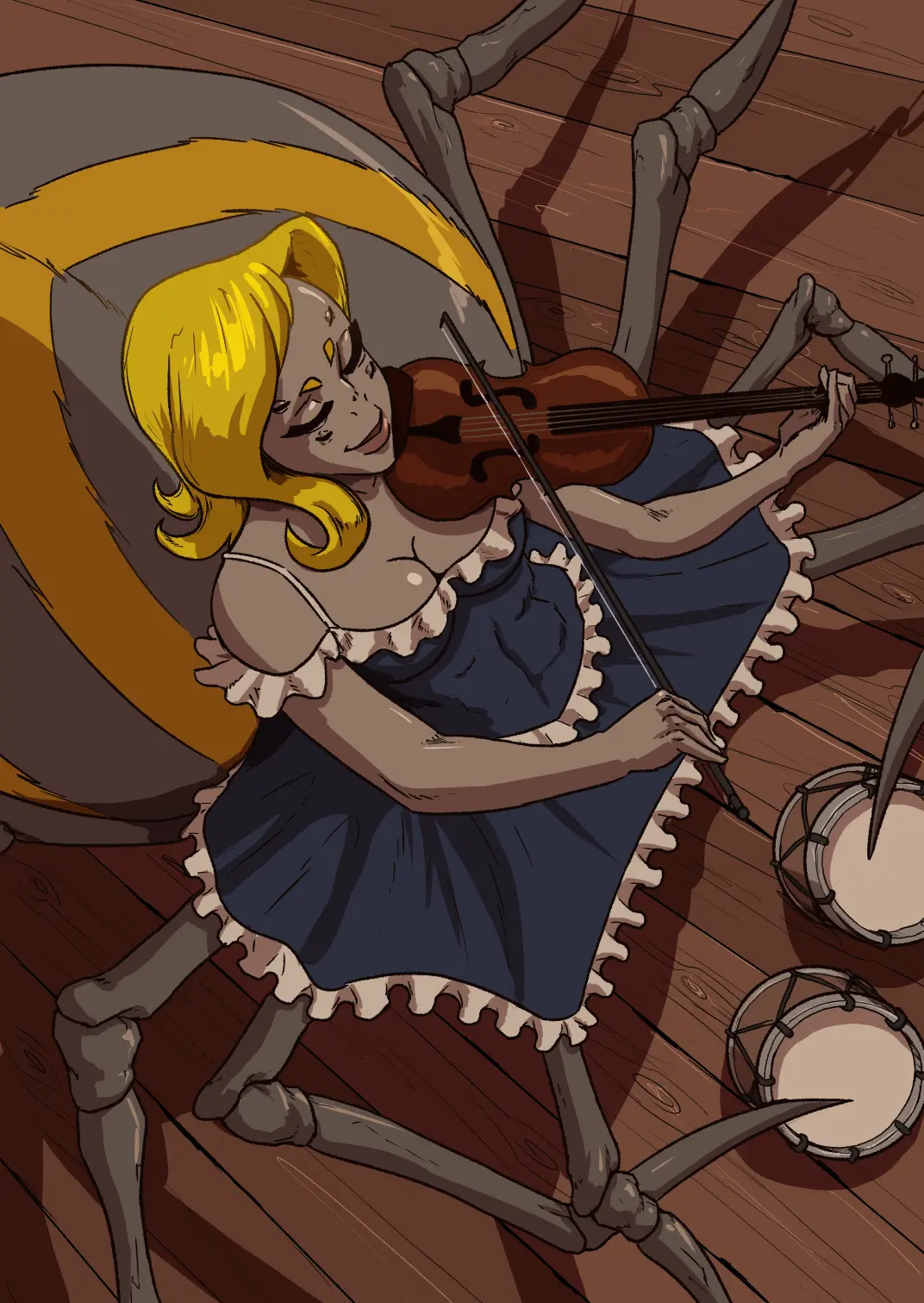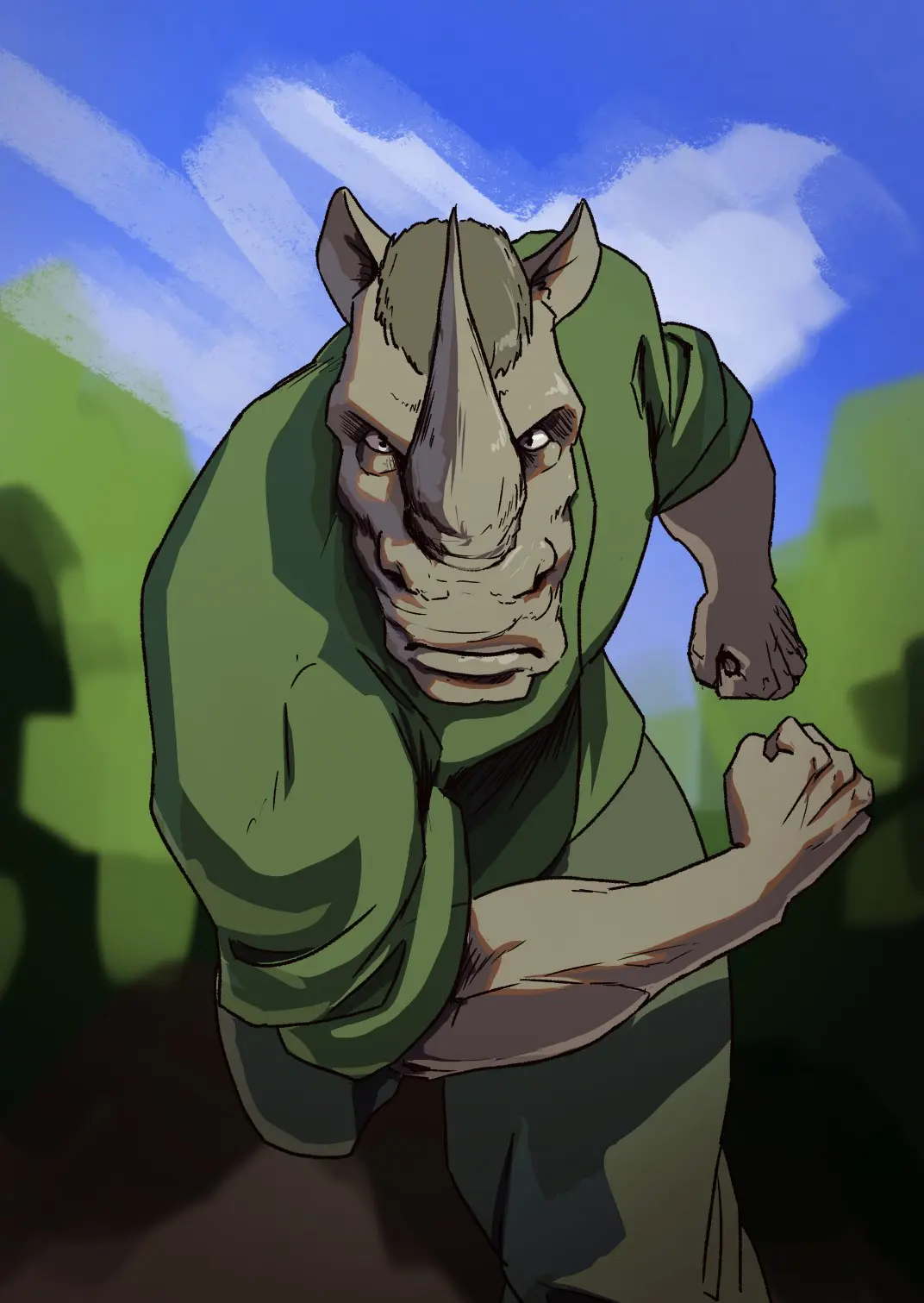Characters

Each player needs a character to embody in the game. How that character is created is described here.

The most important information about a character is written on the Character sheet (see the image on the right). There are:
- character picture
- Back story
- Name and Species
- Level and Experience
- Attributes
- Notes
- Skills
The following is a more detailed explanation of these points.
1. Backstory
The most important thing about a character is their backstory. It is noted on the back of the character sheet. If necessary further pages can be added.
This helps the player to get into the character's head and make appropriate decisions.
When developing the back story, keep in mind, that the more detailed the better! Typical questions that help are:
- What is the character's name?
- What species does he belong to?
- Where does the character come from?
- In which environment did they grow up?
- What situations have shaped the character? (Relationships, accomplishments, trauma).
- What is this character particularly good at? What not at all?
- In which situations does the character feel comfortable? What situations does the character avoid?
- What motivates a character, what's their goal?
To get some ideas, it is worth taking a look at the game world. The game master can also be consulted in case of problems or questions. This exchange is also important, so that the game master can bring in objections and to integrate the characters backstory into the planned adventure.
It is often useful if the players do not know the backstory of the other characters. After all, it is an important part of the game to learn the secrets and backgrounds of the other players over the course of the adventure.
Important: A good back-story can lift some restrictions on character creation. e.g. Players want to give their characters an absurdly strong ability? Raise and attribute or skill above the limit at character-creation? No problem, they just have to come up with an appropriately good back-story and, if needed, something in their character to counterbalance it. For example, this can be a negative character traits. The decision whether a restriction may be lifted must be made by the game master.
2. Name and Species
On the front of the character sheet, public information is noted that all players may know. First of all there is the character name and the species.
Players can select their species from the playable species. If a player wants to choose something that's not on the list or a mix of multiple species, they have to come up with a believable backstory, as such anomalies are unusual in Lysima.
3. Level and experience
Under the species, the level and experience points are noted.
Often new characters start at level 0 with 0 experience points. However, the game master may allow players to start at a higher level. The additional levels are applied to the character according to the character progression.
4. Attributes
Attributes describe the basic potential that a character has. They are the basis for all skill-checks. Each character has the following attributes:
- Body: Represents physical strength and physical steadfastness.
- Skill: How well a character can perform fine motor tasks and how fast they are.
- Perception: How observant a character is.
- Intuition: How well a character can make gut decisions. Also determines mental resilience.
- Intelligence: How good a character is at understanding the things around them.
- Charisma: What impression a character makes on others, or how well they can read others.
The strength of an attribute is represented by a numerical value.
Ad character creation, 20 points can be freely distrivuted across these attributes.
All attributes start at 0.
Please note that an attribute may not be increased above 10 at creation. Exceptions should be discussed with the game master and justified by a good reason in the backstory.
Attributes can also have negative values. If the game master agrees, a player can give their attributes a negative value in order to gain additional attribute points.
Increasing an attribute by 1 level costs 1 attribute point**.
As soon as the attribute points have been distributed, physical and mental resistance are calculated. The formula for calculating the resistance values is as follows:
physical resistance: 30 + 2 * body
Mental resistance: 30 + 2 * intuition
The value is then noted in the character sheet. These values must be updated when leveling up.
An attribute value of 0 does not mean that a character is useless in this attribute. The attribute value is 1:1 the bonus the character receives on skill-checks rolled for the corresponding attribute.
5. Notes
Here you note character traits or other noteworthy information in bullet point form, such as:
- arrogant
- curious
- mechanical arm
It should give everyone a brief overview of what makes a character tick. A player decides what is important enough to be noted here.
Important: Nothing about backstory is written here, only traits that result from it.
Inventory is also noted here, see items.
6. Skills
Skills are specialised knowledge that helps a character with certain actions. They support the player in their actions in addition to their attributes.
In Machines and Sorcery there is no ready-to-use list of skills. Players choose their skills themselves. However, new abilities should always be discussed with the game master beforehand, as he must determine whether an ability is permissible.
How good the character is at a skill is determined by a numerical value between 1 and 5.
At creation, 10 points can be freely distributed.
There are 3 rules for creating new skills:
1. a new skill covers an area that is not yet covered by another skill. 2 Skills may not be the same in their area of application.
2. a skill is a specialisation of another skill. Example: A character already has "Mechanical Engineering". He can now take the skill "Airship Construction", which is a specialisation of Mechanical Engineering.
3. a skill may not be the same as an attribute, as to just augment the attribute in any case.
A player can create as many skills as they like. To create a skill costs 1 point, the skill is then at level 1. Increasing a skill by 1 level also costs 1 point. For example, creating a skill at level 3 costs a total of 3 skill points.
A player is not yet allowed to choose specialisations when creating a character. The game-master can allow exceptions.
During the course of the game, skills are used as bonuses on skill-checks. During a check, the player must bring up their skills and the game master must decide whether the skill matches the player's action.
Examples of initial skills:
- Airship pilot
- Archery
- Handling firearms
- Sword fighting
- Blocking with shield
- Paraian tap dance
- Singing
- Drunken fists
- Daydreamer
- Mechanical Engineering
- Empathy
You should also create abilities for species-specific strengths of the character so that they can be used as a bonus on checks. Just adding "Night Vision" under notes does not give a bonus on checks.
It is recommended not to focus skills only on combat. A character does not spend 100% of his time fighting, but pursues other hobbies.
A warrior may be passionate about drawing, which is also reflected in his fine swordplay.
An assassin has discovered a passion for singing during one of her missions.
Depending on how the players later describe their actions, they can also utilise abilities, that are not obvious at first glance.
Combining and creatively utilising skills is one of the core elements of Maschine and Sorcery.
Note: Skills can also be provided by items and tools. For example, if a player has a mechanical arm with a built-in welding machine, he can receive "Welding Machine" 3 as a skill. This can be used in appropriate situations.
How exactly skills are used in the skill-checks is described under skill-checks.
7. Body modifications
In the world of Machines and Sorcery, it is possible to replace or improve body parts in various ways.
7.1. Mechanical modifications
Characters can replace lost body parts with mechanical prostheses. These are directly connected to the nervous system and can be controlled like a biological body part.
However, these prostheses are expensive and not so easy to obtain outside of Nistria. They are mainly available for humans, as there are very few engineers who develop mechanical prostheses for Tipu and Dyr. A human living in Nistria has no problems getting hold of a prosthesis. With a Dyr or Tipu, however, the player must come up with a story about where the prosthesis comes from.
A normal prosthesis is only capable of replacing the corresponding body part in its function. If a player wants further special functions, these prostheses become expensive. Here the game-master must decide what the players are allowed to do.
Possible special functions are:
- special strength
- built-in tools (welder, saw)
- built-in weapon (blade, firearm)
- ...
7.2. Biological modification
In eastern Nistria, much research is done on biological modification. For the characters who come from there, or were once there, it is possible to use biological modifications. These make it possible to replace or extend limbs. Body parts from other species are readily attached to humans to gain the biological advantages of the corresponding species.
Here, an exchange of body parts is only possible between humans and Dyr. A human cannot have an arm of a Tipu, as the two organisms function fundamentally differently.
Again, the stronger the modifications, the more expensive they are. Consultation with the game-master is necessary.
8. Special mechanics
This is an approach for players who like to experiment. Players are welcome to come up with their own mechanics for their character that give them special strengths and weaknesses. How these work is up to the players and game masters. Be sure to discuss these ideas with the game-master.
Examples:
A character has a split personality. Which one is currently active is decided by a die. Each personality has its own character sheet.
9. Travel Diary
This is not a rule in the strict sense, but more of a suggestion.
A character story can be written as if it were a diary or a story told in a tavern. For this, the character can keep a diary after each game session, in which he or she notes down the events from the point of view f their character. This way they can note their line of thought (of that of their character).
These diaries can then be added to the backstory. This way, a small memory can be created over the course of an adventure.
10. Character Development
Characters evolve over the course of their adventures and become stronger.
10.1. Experience Gain
Over the course of adventures, a character gains experience points. These are consistently added up.
How experience points are awarded is very dependent on the game master's style. They must decide what exactly should be rewarded with experience points. The following player achievements could be rewarded:
- Completing a mission
- Exploring the environment
- achieving special achievements
- good roleplaying
Player achievements can also be rewarded directly at the moment they happen, e.g. After the players solve a problem they get 1 experience point.
10.2. Level-Up
If the total amount of experience points exceeds a certain limits, the character rises in level.
The following table indicates how many experience points are required for which level.
| Level | Experince-points |
|---|---|
| 1 | 10 |
With every level up the character receives 1 skill point and with every 2nd level up 1 attribute point. e.g.: When advancing to level 1, a character does not receive an attribute point. However, when rising to level 2, they do get one.
11. Short summary
this section only contains all important values in a short table, to find them easily later.
| Description | Value |
|---|---|
| Attribute points on character creation | 20 |
| Starting value for attributes | 0 |
| Skill points at character creation | 10 |
| Maximum skill value | 5 |
| Skill points per level up | 1 per level up |
| Attribute points per level up | 1 every 2 level ups |
The next chapter describes the general gameplay: Gameplay.
12. Example characters
To make it easier to get started, we have created two characters here as an example.
12.1. Sira Leucosi

Backstory
I'm Sira and I grew up on a small island in the tyrian sea. My parents had a little tavern there. One day, my father won an old violin in a bet, that I started to play on every day. In the beginning, I was really annoying my parents and the other guests, but over time I got better and better. After a while I asked my father to get me more instruments. Somehow it was easy to learn new instruments. At some point, I started playing multiple instruments at the same time. As a one-man-orchestra i could lighten up the whole tavern. Happy guests just pay more. It was great.
Occasionally, an old acquaintance of my father was visiting the taver, who I started to play together with. Her name was Mira, and we made a fantastic team. When I was 14, everything changed. After a festivity for the ruler of the island, we were raided by a group of pirates. My mother yelled at me, to run to the tavern and hide. I did, as she wanted and ran off. It was the scariest night I ever had. When the first light came through the hatch and the combat noise ceased, I carefully left my lair. When I stepped out of the door, I was shocked. There were blood and corpses everywhere. Though most people sought protection at the guards. my parents hadn't made it. I spend the next days in the tavern, unable to leave. I didn't want to see anyone. I even started destroying the interior.
Only Miras persistence managed to tear me loose from my impotent rage. She was devastated when I told her what had happened. Instead of leaving me to my fate, she took me with her and thought me the only thing she could, Bounty hunting. The only problem was, that she didn't always deliver her targets alive. My parents taught me that nothing justifies killing another person, not even justice. That was the only thing I had left of my parents, so I couldn't let it go.
Luckiely, Mira could teach me to manipulate people. This way I could play my Bounties against each other. I was able to bring them in without killing. Using my sticky webs, I was able to lure my targets into very effective traps. With my skills, also gre my desire fore revenge. I was working as bounty hunter and musician, always trying to find the murderers of my parents. One day, i'll find them...
12.2. Nils Felsenrutsch

Backstory
I come from a proud family of warriors. Many of my ancestors where great fighters in the chapter of strength. So I was destined to live in the order since my birth. They accepted me when I was 4 years old and started to train me. The first years were hard, but you get used to it. It also helps to lean that you have to make sacrivice for the common good.
In my training, I was thought to use my natual strength to crush my enemies. The most important part was hand-to-hand combat and the charge. We Rhinos have bad eye-sight. For that, my combat reflexes where trained a lot. That means to feel what's going on in a fight without using your senses. It is hard to describe, if you train enough, you start to sense when an attack is coming and where your foe is without looking. Sometimes it is hard to suppress these reflexes when there's no real danger.
After my training I traveled the lands for my order. One day, we had to attack a bandits nest. The fight went smooth. After we won, we should take down the last remaining stragglers. We had strict order to kill everyone. When I was chasing them, I saw that they were only children. While all my colleagues continued butchering them, I couldn't do it, and I was just watching.
This didn't go well with our leaders. I was banished from the order. Since then im working as a mercenary. I was forbidden to tell anyone what I learned throughout my training at the order. Disobeying means death.
Next Chapter: Gameplay.
